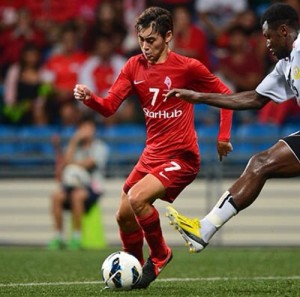Singapore has a Chinese population of more than 70% and yet according to figures from the S-League, only a paltry 16 out of 151 registered first-team players are Singaporean Chinese. This is a worrying sign, showing that Singapore is not fully utilising its resources. When a nation of five million people only draws its football talent from one third of its population, there’s only so far a country can go. Singapore, currently ranked 155th in the latest FIFA world rankings, has been struggling to make a significant impact on the Asian stage for years.
The year 2010 has come and gone. Goal 2010 which had the aim of reaching Singapore’s first ever World Cup finals is now nothing more than a mere pipe dream. It’s currently the year 2015 and not only has the Republic not qualified for the World Cup (no surprises there), they also seem to be losing their dominance of the ASEAN region. Being embarrassingly knocked out of two of South-East Asia’s most prestigious tournaments, the AFF Suzuki Cup and the Sea Games, at the group stages as hosts are all that Singapore has got to show for in recent years. Something needs to be done to stop the rot and tackling the problem of a dearth of Chinese talent coming through the ranks has got to be on the priority list.
Lack of Quality
In order to find a notable Singaporean-born Chinese player playing for the national team, one would have to go about 10 years back when Goh Tat Chuan was still plying his trade in the middle of the park as a holding midfielder for Singapore. These days, Chinese footballers in the national team are few and far between, with only LionsXII winger Gabriel Quak being called up for recent national squads. There are still Chinese players in Singapore.
According to the recent report about Chinese footballers in The New Paper, there are just about enough Chinese players in the S-League to form a starting 11 complemented with some substitutes. However, the quality is just not there. Only two of these local born Chinese players have made a senior appearance for the Lions. This is a serious case of a lack of both quantity and quality.
Gabriel Quak (in red) is currently the only Chinese player to get regular call-ups to the senior national team. Photo Credit: Wikipedia
Pragmatism
Pragmatism rules over passion for many Chinese footballers and their families. Playing for leisure is strongly encouraged but when it comes to down to the crunch decision of whether to go pro, the answer is mostly no. A football career in Singapore does not pay financially. Stories of millionaire footballers are unheard of on our shores since Fandi Ahmad. Only Singapore’s finest players can claim to command salaries significantly better than what jobs in other industries provide. Also, footballers have a short career and what will await life after football is a period of uncertainty and instability. As such, conservative and pragmatic Chinese parents are often not willing to give their blessings to their child for a career in football.
Balancing Act
However, all is not lost. The onus to pursue a professional career without jeopardising one’s future will be on the individual and it depends on how much he wants it. It is possible to balance studies and football or even work and football. Goh Tat Chuan holds a degree holder from Nanyang Technological University and had a career as a commercial engineer after his retirement.
Another example is former S-League player Jeremy Chiang who ventured into business. His latest venture is a shop selling Spanish snack churros. He is doing pretty well and has shown that there is indeed life after football for Chinese players as long as a certain level of commitment is shown. S-League clubs can also do their part by showing flexibility and allowing their players to pursue whatever they want in their free time outside of football. With such increased flexibility, players will have more time pursuing their “backup plans” for football and this will give reason for more to join the football bandwagon as a professional.
Chinese players are known for their hard work and grit in football. These are qualities that could serve Singapore very well and it would be a waste if this vast amount of talent is not tapped on. A small talent pool hinders progress. For Singapore, it is not a problem of a lack of talent but rather a lack of the ability to retain talent in the system. Solve that and we could well be on our way to our first World Cup, Goal 2030, anyone?





